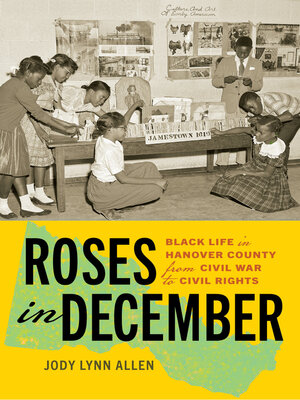Roses in December
ebook ∣ Black Life in Hanover County from Civil War to Civil Rights · Carter G. Woodson Institute Series
By Jody Lynn Allen

Sign up to save your library
With an OverDrive account, you can save your favorite libraries for at-a-glance information about availability. Find out more about OverDrive accounts.
Find this title in Libby, the library reading app by OverDrive.



Search for a digital library with this title
Title found at these libraries:
| Library Name | Distance |
|---|---|
| Loading... |
The inspiring chronicle of a Black community in Virginia fighting for civil rights over the course of a pivotal century
Roses in December is a story of strength, courage, and beauty found in difficult times and the most challenging of circumstances. Beginning in the era of Reconstruction and ending with desegregation, Jody Lynn Allen chronicles the lives of newly freed people and their descendants in Hanover County, Virginia, providing an unprecedented look at rural Black Virginians' resilience after disfranchisement. In the century between 1865 and 1965, Black residents of Hanover County embraced liberty as they organized for education, employment, and religious freedom, and built a community that flourished in the face of white retrenchment and day-to-day oppression. In this at times poignant, at times funny, and always powerful book, Allen's attention to local, community level history offers an overlooked yet vital perspective of the civil rights movement in the rural South.
Roses in December is a story of strength, courage, and beauty found in difficult times and the most challenging of circumstances. Beginning in the era of Reconstruction and ending with desegregation, Jody Lynn Allen chronicles the lives of newly freed people and their descendants in Hanover County, Virginia, providing an unprecedented look at rural Black Virginians' resilience after disfranchisement. In the century between 1865 and 1965, Black residents of Hanover County embraced liberty as they organized for education, employment, and religious freedom, and built a community that flourished in the face of white retrenchment and day-to-day oppression. In this at times poignant, at times funny, and always powerful book, Allen's attention to local, community level history offers an overlooked yet vital perspective of the civil rights movement in the rural South.







